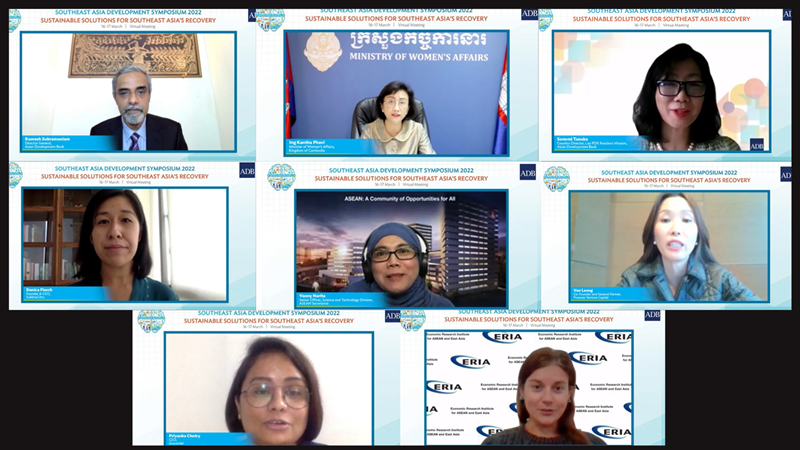ERIA-ADB SEADS 2022: Women Leaders Driving Sustainable Transformation in ASEAN
Date:
16 March 2022Category:
NewsShare Article:
Print Article:
Jakarta/Manila, 16 March 2022: Despite the severe damage brought by COVID-19, Southeast Asia countries intensified efforts to build back better for a resilient, inclusive, and sustainable future in a world reshaped by the pandemic. At the centre of a sustainable post-pandemic recovery, gender equality and women empowerment are fundamental to ensure an inclusive sustainable transition. Across the region, ASEAN female leaders from different fields are driving the region’s sustainable transition through policy leadership, scientific advancements, and the creation of new business models. Among those are female leaders paving the way towards sustainable transformation in sectors such as digitalization, impact investment, STEM, and MSMEs development.
As part of the annual ADB Southeast Asia Development Symposium (SEADS), on 16 March 2022, ERIA co-organized a session on Women Driving Sustainable Transformation in ASEAN, with the aim to discuss challenges, opportunities, and new approaches to forward-looking strategies on sustainability in the region.
The session was opened by Mr Ramesh Subramanian, Director General of Southeast Asia Department, ADB, who began with an important message: ‘a sustainable Southeast Asia region after COVID-19 is one that is led by women.’ He explained how the pandemic has exacerbated gender inequality with women being more prone to negative impacts such as job loss, unsafe living conditions, and limited access to resources to sustain themselves and their families. Therefore, pursuing sustainable and inclusive post-pandemic recovery solutions should first and foremost address these issues. He further highlighted how women’s leadership and diversity in the policy-making sphere are fundamental to generating more innovative and inclusive solutions.
H.E Dr Ing Kantha Phavi, Minister of Women’s Affairs, Kingdom of Cambodia, set the scene for discussion by delivering key points on gender equality and women empowerment in the context of global challenges such as climate change and the sharp increase of global poverty. She further elaborated how ASEAN has laid the groundwork for this transformative approach with recent milestones including the 2022 ASEAN leaders’ special session at the 36th ASEAN Summit on Women Empowerment and the first ASEAN Women Leaders in 2020. In response to the pandemic, she emphasized the need to ensure that women be the architects and beneficiaries of the recovery solutions and that women’s leadership and contribution be at the heart of recovery, particularly for the ASEAN Comprehensive Recovery Framework. Under the Cambodia ASEAN Chairmanship, she highlighted how digital transformation, women entrepreneurship, and mission-driven business will strengthen the capability of ASEAN to recover stronger.
Four speakers continued to share their thoughts and experiences on how their work drives the current and future sustainable transformation in ASEAN:
Ms Denica Riadini-Flesch, founder and CEO of SukkhaCitta, Indonesia, shared her story of building her social enterprise to protect rural women in Indonesia from poverty by focusing on access to fair living wages through sustainable clothing. She explained how her business has grown despite the pandemic as she adjusted her business model to create more innovative products. From her perspective, the social business model is key solution for inclusive growth in ASEAN.
Ms Priyanka Chetry, CEO of Grocerdel, Cambodia, explained how she grows her e-commerce business that aims to deliver fresh, local products from small-scale farmers to the consumer across Cambodia. She observed that COVID-19 has changed the behaviour of customers where they are not only moving to online platforms for groceries but many of them also looking for sustainable and environmentally friendly products. She highlighted that building trust between farmers, producers and consumers is an integral part to retain her sustainable business model.
Ms Von Leong, Co-founder and General Partner, Purpose Venture Capital, Singapore spoke about how impact investing is still a nascent industry across many types of investment in ASEAN, although there’s a growing market in which more investors or organizations manage and allocate their budget for impact investment. She further highlighted challenges faced by many impact investors such as sourcing of quality-investment opportunities, having suitable and healthy exit options, and navigating through the uncertainty of global politics. Therefore, partnering with long-term committed investors such as government, eco-business, and philanthropic foundations is important to build inclusive sustainable investment, especially to support more women-led business and women investors in the region.
Ms Vanny Narita, Senior Officer, Science and Technology Division, ASEAN Secretariat accentuated the gender gap of women doing STEM research. As a young scientist, she highlighted the current situation where there’s still a limited number of women working in certain STEM sectors such as AI applications and health technology. However, she saw a positive outlook where more women were increasingly interested in AI and data science in ASEAN. In addition, she underlined the importance of partnerships between scientists, technologies, engineers, and entrepreneurs to foster innovation and economic growth in the region.
During the Q&A session, speakers and the moderator discussed how to move forward with advancing gender equality and inspire more women to lead the sustainable transformation in ASEAN, which includes involving more women in policy-making decisions and economic development priorities as well as bridging the digital divide for women entrepreneurs in rural and urban areas.
The closing remarks were delivered by Dr Giulia Ajmone Marsan, Strategy and Partnership Director of ERIA, who highlighted two key messages: 1) innovation, including through the development of new approaches and mindsets, should be retained when building the sustainable transformation in ASEAN; 2) horizontal and cross-cutting collaboration with diverse stakeholders (policymakers, entrepreneurs, scientists, eco-system builders, etc.) is imperative for a successful recovery. To continue supporting this conversation, ERIA just launched the new platform of Entrepreneurship, Startup and Innovation (E-S-I) Knowledge Lab.
The session was moderated by Sonomi Tanaka, ADB Country Director in Lao PDR. The ADB SEADS was established by ADB to convene leaders from government, industry, academia, and the development sector to put forward innovative ideas and support critical issues in the region and to connect over 5,000 participants annually.








